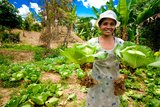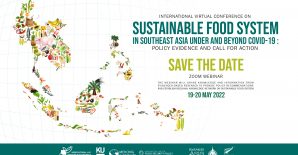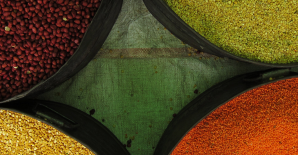The “state of the art” technical conference on "Knowledge, Tools, and Lessons for Informing the Design and Implementation of Food Security Strategies in Asia" was held in Kathmandu November 14-16, 2011. The event was organized by the International Food Policy Research Institute (IFPRI) and Nepal’s Institute for Integrated Development Studies (IIDS), and supported and funded by the United States Agency for International Development (USAID).

Day One | Day Two
Day One: Monday, November 14th, 2011
Welcome Remarks
- Hon'ble Deependra Bahadur Kshetry, Vice-Chairman, National Planning Commission (NPC)
- Fulgen Pradhan, Joint Secretary and Chief, Planning Division, MOAC, GON
- Sheila Lutjens, USAID/Nepal Mission Director
- Paul Dorosh, Division Director, Development Strategies and Governance Division, IFPRI
- Mohan Man Sainju, Board Chairman, IIDS; Former Vice Chairman, NPC
Session 1: Improving Food Security Outcomes Through Agriculture – The State Of Knowledge
Overview of Workshop Objectives and Goals, Paul Dorosh, Division Director, Development Strategies and Governance (DSG) Division, IFPRI
Key Note Speaker: “Big picture overview of challenges and opportunities for achieving food security in Asia”, Sohail Malik, Chairman, Innovative Development Strategies (Pvt.) Ltd., Islamabad, Pakistan and Visiting Senior Research Fellow, IFPRI
Panel: “Regional perspectives on the unique challenges for food security in Central, South Asia, and Southeast Asia regions”
- Alisher Tashmatov, Executive Secretary, Caucasus Association of Agricultural Research Institutions (CACAARI)
- Wais Kabir, Executive Chairman, Bangladesh Agricultural Research Council (BARC), and former Director of the Agriculture Center of the South Asian Association for Regional Cooperation (SAARC), 2002 – 2009.
- Suriyan Vichitlekarn, Association of Southeast Asian Nations (ASEAN)
PARALLEL SESSIONS 1-A: Policy environment and rural-urban transformation – implications for availability and access to food
Enabling policy environment for ensuring rural income growth and food security: Overview of key policy challenges for creating an enabling environment for agricultural and rural transformation, food and nutrition security in the South and Central Asia region.
|
Rural-urban links and access to markets (domestic and regional): Examining rural-urban links and access to markets for high value products, agribusiness links within and across countries, and potential implications for income and food security outcomes.
|
PARALLEL SESSIONS 1-B:Science & Technology Solutions for increasing availability and access, including climate change adaptation and mitigation options
PARALLEL SESSIONS 1-C: Integrating agriculture and nutrition interventions for adequate utilization & stability
Agriculture and nutrition linkages through cross-sector approaches: Exploring synergies between agriculture and nutrition, and importance of cross sector interventions
|
Gender dimension: Gender dimensions for improved food security and nutrition outcomes through agriculture
|
Agricultural and nutrition linkages through bio-fortification: Improving food and nutrition security through bio-fortification alternatives: lessons in Asia
|
Day Two: Tuesday, November 15th, 2011
SESSION 2: TRANSLATING KNOWLEDGE INTO ACTION – LESSONS, EXPERIENCE AND PRACTICAL TOOLS
Panel: “Reflections and experience with country processes for bringing evidence into the design and implementation of agricultural and food security strategies”
- Governments of Nepal, Cambodia and Bangladesh
- Cambodia: Srun Darith, Council for Agricultural and Rural Development (CARD)
- Nepal: Fulgen Pradhan, Planning Division, Ministry of Agriculture and Cooperatives (MOAC)
- Bangladesh: M. A. Sattar Mandal, Member, Planning Commission
- Research and/or Donor group
- Cambodia: Nou Keosothea, Cambodia Development Resource Institute (CDRI)
- Bangladesh: Wais Kabir, Executive Chairman, BARC
- Nepal: Gayatri Acharya, World Bank
PARALLEL SESSIONS 2-A: Review of experience and lessons of program design and implementation
Raising agricultural productivity: Review of lessons and experience with agricultural interventions to raise agricultural productivity all along the value chain for ensuring food security, including NRM and sustainable intensification technologies – examples to be represented from three sub-regions
|
Improving access to markets, services, and income generating opportunities: Review of lessons and experience with agricultural interventions for improving access to markets, services, and income generating opportunities – examples represented from three sub-regions
|
Pro-nutrition interventions –integrating agriculture with other sector interventions: Review of experience and lessons for successful integration of agricultural interventions with other sector inventions – examples represented from three sub-regions
|
PLENARY SESSION: Review of approaches, tools, and data systems for M&E
Panel of Speakers:
- “Ex-post project impact evaluation methods” Akhter Ahmed, IFPRI/Dhaka
- “Designing baseline surveys for impact analysis and evaluation of progress” Kristin Penn, USAID/BFS
- “Beyond Experiments: General Equilibrium Simulation Methods for Impact Evaluation" Xinshen Diao, IFPRI and Edward Taylor, University of California
- “Reflections on challenges for program design and implementation” Sanath Reddy, USAID-Indonesia
PARALLEL SESSIONS 2-C: Knowledge system tools and approaches for bringing evidence into policy action
“Monitoring progress of agriculture, food security and nutrition outcomes at regional level”: Review of methods and tools for monitoring key indicators across countries.
|
“Web-based knowledge management systems and tools for agriculture and food security”: Review of lessons and experiences with web-based knowledge management and information systems/tools for agriculture and food security in Asia region.
|
“Lessons, approaches and capacities for linking evidence with policy”: Review of approaches, tools and capacities for translating evidence into policy action.
|




Leave a Reply